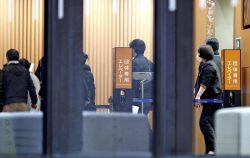14:05 JST, January 3, 2022
New curriculums related to the production and development of semiconductor products will be added at eight technical colleges in the Kyushu region, in a bid to enhance Japan’s manufacturing capabilities in this field, according to government sources.
The curriculums may be added to the colleges as early as fiscal 2022, the sources said.
Amid a shortage of semiconductor products worldwide, the government aims to increase the number of technologically skilled people in Japan and reclaim the nation’s past status as a global leader of the semiconductor industry.
Taiwan Semiconductor Manufacturing Co. (TSMC), a major commissioned manufacturer of semiconductor chips, is scheduled to build a factory in Kumamoto Prefecture.
The government plans to enhance the curriculums of eight technical colleges in six prefectures in the Kyushu region — Kumamoto, Fukuoka, Nagasaki, Oita, Miyazaki and Kagoshima — as bases for fostering human resources in the field. Students will receive specialized training in semiconductor technology, so that Japan’s base of semiconductor experts will be widened.
Technical colleges are institutes of higher education that offer specialized curriculums, over five years in principle, for students who graduated from junior high school. In addition to ordinary curriculums, students take classes in subjects including machinery, electronics and chemistry, with a priority on experiments and practical training.
According to a government source, however, “although graduates’ technological abilities are high, there has been almost no instruction regarding semiconductors. So there are few human resources who can flourish in the semiconductor industry.”
The new curriculums will likely focus on specialized knowledge and skills related to semiconductor products. Details will be discussed and decided by the Kyushu Bureau of Economy, Trade and Industry, other administrative entities, and companies that research and manufacture semiconductor chips.
The bureau aims to ascertain the technological levels that companies require, and consider details of the new curriculums in collaboration also with the Education, Culture, Sports, Science and Technology Ministry and the National Institute of Technology, which is an independent administrative entity.
Japan relies on imports from overseas, mainly Taiwan and China, for more than 60% of domestic demand for semiconductor products.
Due to digitization and other trends, worldwide demand for semiconductor chips is likely to increase. Manufacturing such products in Japan is vital from the perspective of a stable supply and economic national security.
The government is accelerating efforts to secure semiconductor products by, for example, introducing legislative measures to build or improve semiconductor plants in the nation.
Top Articles in Society
-

Man Infected with Measles Reportedly Dined at Restaurant in Tokyo Station
-

Man Infected with Measles May Have Come in Contact with Many People in Tokyo, Went to Store, Restaurant Around When Symptoms Emerged
-

Woman with Measles Visited Hospital in Tokyo Multiple Times Before Being Diagnosed with Disease
-

Australian Woman Dies After Mishap on Ski Lift in Nagano Prefecture
-

Foreign Snowboarder in Serious Condition After Hanging in Midair from Chairlift in Nagano Prefecture
JN ACCESS RANKING
-

Japan PM Takaichi’s Cabinet Resigns en Masse
-

Japan Institute to Use Domestic Commercial Optical Lattice Clock to Set Japan Standard Time
-

Israeli Ambassador to Japan Speaks about Japan’s Role in the Reconstruction of Gaza
-

Man Infected with Measles Reportedly Dined at Restaurant in Tokyo Station
-

Videos Plagiarized, Reposted with False Subtitles Claiming ‘Ryukyu Belongs to China’; Anti-China False Information Also Posted in Japan





















